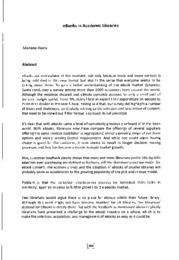| dc.contributor.author | Heins, Marieke | en |
| dc.coverage.spatial | GR - Αθήνα | en |
| dc.date.available | 2010-11-17T12:00:00Z | el_GR |
| dc.date.issued | 2010 | el_GR |
| dc.identifier.uri | http://hdl.handle.net/10797/11896 | en |
| dc.description | Περιέχει το πλήρες κείμενο | el_GR |
| dc.description.abstract | eBooks are everywhere at the moment, not only because more and more content is being published in this new format but also in the sense that everyone seems to be talking about them. To gain a better understanding of the eBook market dynamics, Swets conducted a survey among more than 1000 customers from around the world. Although the response showed that eBooks currently account for only a small part of the total budget spend, about 9%, many libraries expect their expenditure on eBooks to more than double in the near future. Having said that, our survey did highlight a number of issues and challenges, particularly relating to the selection and acquisition of content, that need to be ironed out if the format is to reach its full potential. It's clear that with eBooks came a level of complexity previously unheard of in the book world. With eBooks, librarians now have compare the offerings of several suppliers offering the same content (publisher vs aggregators) under a growing range of purchase options and widely varying license requirements. And while one could argue having choice is good for the customer, it now seems to result in longer decision making processes and thus has become a barrier to rapid market growth. Also, customer feedback clearly shows that more and more librarians prefer title-by-title selection over purchasing pre-defined collections, still the dominant purchase model for eBook content. The economic crisis and the adoption of eBooks of smaller libraries will probably serve as accelerators to the growing popularity of the pick and choose model. Problem is that the collection development process for individual titles lacks in simplicity, again an impetus to further growth to the eBooks market. Few librarians would argue there is no place for eBooks within their future library. Although this need might not have become manifest for all libraries, the librarians' demand for eBooks is clearly there. But with the feedback as mentioned above implicitly librarians have presented a challenge to the eBook industry on a whole, which is to make the selection, acquisition, and management of eBooks as easy as it could be. eBooks is still a new format, but it is beginning to get a foothold within our industry and is proving itself to be much more than a buzz topic for industry commentators. As the eBook suppliers and vendors seriously address these issues, the viability of the electronic format for academic libraries in particular seems more assured. Swets for one will play its part in addressing this challenge. | en |
| dc.language.iso | eng | en |
| dc.publisher | Βιβλιοθήκη και Υπηρεσία Πληροφόρησης Παντείου Πανεπιστημίου | el_GR |
| dc.relation.ispartof | Παρουσιάσεις και προτάσεις χορηγών-εκδοτών | el_GR |
| dc.source | Επιστημονικές κοινότητες και βιβλιοθήκες στον κόσμο της κοινωνικής δικτύωσης και συνέργειας - 19ο Πανελλήνιο Συνέδριο Ακαδημαϊκών Βιβλιοθηκών | el_GR |
| dc.source.uri | http://abekt.lib.ucy.ac.cy/synedria/19psab/19psab020b.pdf | en |
| dc.source.uri | http://abekt.lib.ucy.ac.cy/synedria/19psab/19psab020a.pdf | en |
| dc.title | eBooks in academic libraries | en |
| dc.type | Conference Object | en |
| dc.subject.JITA | Πηγές πληροφορησης, υποστήριξη, δίαυλοι, Ηλεκτρονικά βιβλία | el_GR |
| dc.subject.JITA | Information sources, supports, channels, e-books | en |
| dc.contributor.conferenceorganizer | Πανελλήνιο Συνέδριο Ακαδημαϊκών Βιβλιοθηκών | el_GR |
| dc.identifier.JITA | HO | en |

